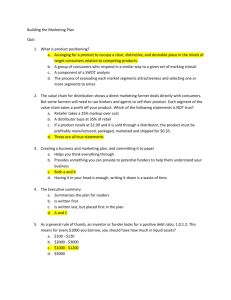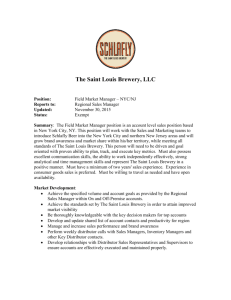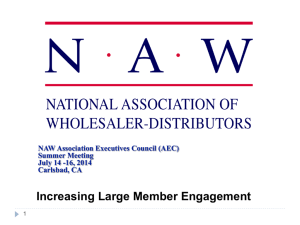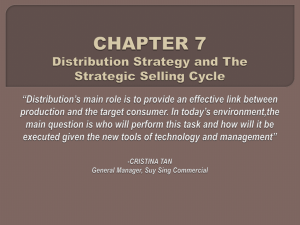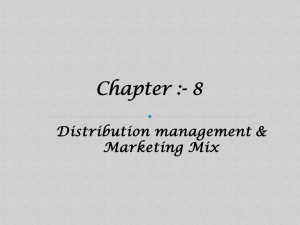How Music Distributors Work
advertisement
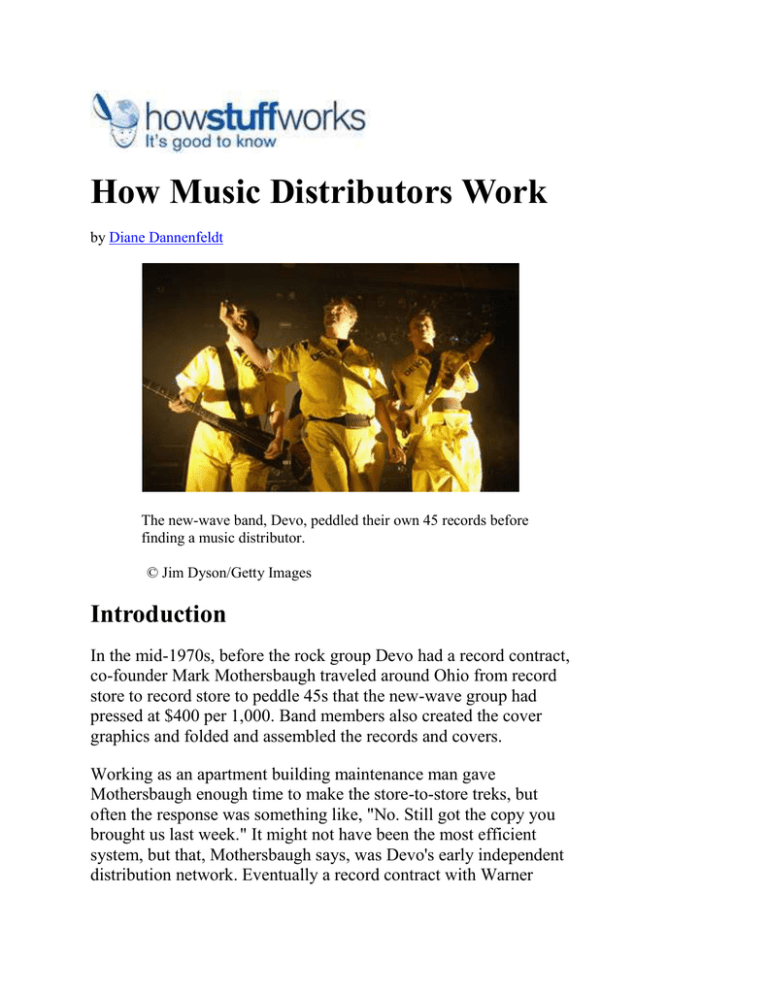
How Music Distributors Work by Diane Dannenfeldt The new-wave band, Devo, peddled their own 45 records before finding a music distributor. © Jim Dyson/Getty Images Introduction In the mid-1970s, before the rock group Devo had a record contract, co-founder Mark Mothersbaugh traveled around Ohio from record store to record store to peddle 45s that the new-wave group had pressed at $400 per 1,000. Band members also created the cover graphics and folded and assembled the records and covers. Working as an apartment building maintenance man gave Mothersbaugh enough time to make the store-to-store treks, but often the response was something like, "No. Still got the copy you brought us last week." It might not have been the most efficient system, but that, Mothersbaugh says, was Devo's early independent distribution network. Eventually a record contract with Warner Bros. brought the trips to an end [sources: Jodi Summers and Devo]. Like yet-undiscovered Devo, many music groups face the dilemma of how to get their music to their audience once they're done writing and recording. The answer is the music distributor, who can make the connection between the band and the fans, increasing the group's visibility and putting cash in its pockets with CD or individual track sales. The world of music sales has changed dramatically since those hand-assembled and personally delivered Devo 45s. Mergers and acquisitions have reduced the number of major music distributors to a handful, and vinyl has given way to CDs and online single-track downloads, but much of the distributor's work remains the same. You may be wondering: How does music distribution work? What types of distributors are there? And how does a band or record label work with a music distributor? Keep reading to find out. When releasing their new album in 2007, the Eagles signed an exclusive distribution agreement with Wal-Mart. © Karl Walter/Getty Images Types of Music Distributors A music distributor links a record label or independent musical group to consumers. The record label signs the group and then oversees recording sessions, marketing, promotion and distribution of the group's CDs to retail stores. Major record labels usually have an in-house music distribution division or an ongoing relationship with an outside distributor. A band without a recording contract, like Devo in the mid-'70s, has to find an independent music distributor to get its message and its music to its fans. The goal is the same: to sell recordings and to increase the group's visibility and popularity by convincing stores to stock and promote its recordings. Promotion can include in-store displays, media advertising, listening stations within the store, sale pricing and even special high-visibility placement of the group's records or CDs. Much of that comes through the distributor's sales reps, who build relationships with the chains and independent stores. The stores either buy with a purchase order or on consignment, only paying when the CD has sold [sources: Jeff Johnson and Musicpowers.com]. Although music downloads eliminate physical records or CDs in an actual store, much of the music distributor's role remains the same, substituting an online music seller, like iTunes or Rhapsody, for the retail store and converting store displays and advertising to pop-ups and e-mail or text message offers. Music distributors can be categorized in several ways: Major label vs. independent -- Consolidation has left only a handful of major music distributors affiliated with the big record labels: Capitol/EMI Distribution (Time Warner), Sony/BMG Distribution, UNI Distribution (Vivendi Universal) and WEA Distribution (Warner Music Group). Independents can be national or regional. Among the independents, the largest is Curb Distribution. Subdistributors -- These are the middlemen between large distributors and retailers. They could be one-stops, which sell from a number of different distributors, or rack-jobbers who actually own and run the record department within a larger department or multipurpose store. National, regional or international -- While the major distributors operate on a national basis, area distributors are smaller and focus on a specific region of the United States, perhaps even a single metropolitan area. International distributors handle one or more overseas markets. Online, Internet or digital distributors -- These distributors supply iTunes, YouTube.com, Rhapsody, Napster and other Web music stores with the tunes that they offer. These distributors may also offer physical CDs, or they may operate only in the cyber-sphere. Niche distributors -- Some distributors specialize in and can be categorized by the type of music they handle, such as classical, Christian, country or alternative music. Printed or sheet music distributors -- Although they only account for a small share of the market, some distributors are actually publishers or work for publishers to sell musical scores, band music, pop songs for guitarists and vocalists, and other "on paper" works. Music distributors like Alan Becker, left, and Bob Morelli, center, both of Reed Distribution shown here with Ed Christman of Billboard, work to get their clients' CDs in stores. © Gary Gershoff/WireImage/Getty Images Working with Music Distributors One way to think of a music distributor is as a wholesaler. That's because the distributor buys CDs from a record label or the band itself, either directly with a purchase order or on consignment, and then sells them to retailers, who offer the CDs to consumers. The price goes up at each step of the process. The label, for instance, sells the CDs for 50 percent of the retail price. The distributor adds a fee to the price, perhaps $2 per CD, and sells to the retailer, who then sells the CD to a customer for full retail price or at a sale rate. The record label usually pays the charges for shipping CDs to the distributor, who often does not pay the label for the CDs until they have been sold [source: Musicpowers.com]. The distributor needs information from the record label, including: The label's trademarked name A catalog number (three letters followed by numbers) for each release A Universal Product Code, or bar code, on the CD label so that its sale can be tracked by the Soundscan software used to monitors music sales The record label or independent music group also puts together a so-called "one sheet" that the distributor and retailer use to sell the CD. Here's what the one sheet usually includes: The label's logo and contact information The CD title The artist's name and band logo The catalog number and bar code The list price The format The date released to radio The street date, if different than the radio release date A short description of the artist's background Brief descriptive information about the music on the CD, including genre Selling points, such as discounts and marketing and promotional plans for the CD [sources: Musicbizacademy.com, Hitsquad.com and Leeway's Home Grown Music Network] If you're new on the scene and trying to attract a music distributor's attention, you'll need to provide more. Distributors prefer to work with bands that can show they've had radio play and success in selling their CDs at live shows or online through their own Web site or sites such as iTunes, cdbaby.com or MySpace.com. And they'll want to know that you have a promotional campaign. So in addition to sending the one sheet and a sample CD to the distributor, include data about your group's radio play, promotions and CD sales [source: Musicpowers.com]. As you look for a music distributor, you may want to: Start with niche distributors that specialize in your band's genre of music. Look for a distributor that offers the flexibility of online CD and digital distribution as well as CD distribution to stores. Check the distributor's financial status and contact its references. And be prepared to sign a written contract for an exclusive agreement, allowing the distributor to represent your group exclusively. Finally, recognize and be ready to go with the changes sweeping the music industry. Artists are turning to alternative distribution strategies. Consider Paul McCartney's release of an album on Starbucks' Hear Music record label and the Eagles' exclusive distribution deal with Wal-Mart. And music is available almost anywhere, not just in stores and at online music sites, but also through streaming interactive subscription services such as Rhapsody, satellite radio subscription services like Sirius, video games, social network sites like MySpace and mobile phone carriers such as Verizon Wireless with its VCast music store. Related HowStuffWorks Articles How Music Licensing Works How Music Producers Work How Music Royalties Work How Record Labels Work How Recording Contracts Work From: http://entertainment.howstuffworks.com/music-distributor.htm

